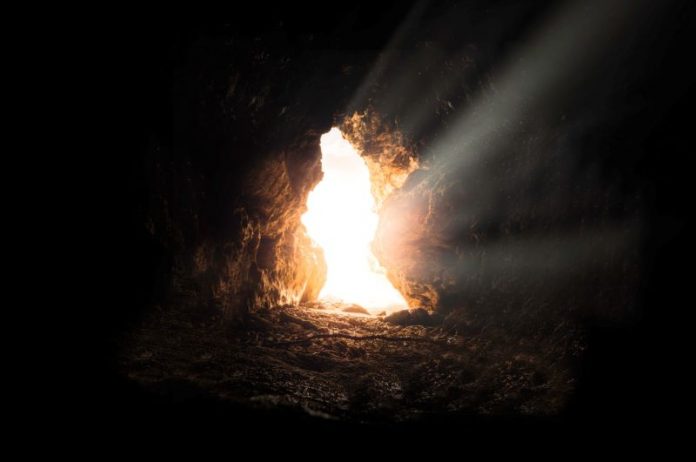
COLLEEN R. VERMEULEN
“Stay Home. Stay Safe. Save Lives. This order takes effect on March 24, 2020 at 12:01 am, and continues through April 13, 2020 at 11:59 pm.”
And with that, what I’d seen coming in mid-March was now a reality. It’d be an Easter Vigil without the Exsultet. Now, of course, that’s not quite accurate, there will be live-streamed Mass. But, it will be an Easter Vigil where I’m not part of a vast sea of worshippers, waiting in anticipation of a single voice breaking out of the evening’s silence and darkness, proclaiming, “exalt,” rejoice!
I fell in love with the Easter Vigil by accident, during my freshman year of college. A Catholic friend from my dorm and I had the great idea that we’d avoid the big crowds of Easter Sunday Mass and instead go to the Saturday evening Mass. Back then, we had no idea this was going to be an out-of-the-ordinary Mass, but I was captivated as the hours of Vigil went on.
In the 19 years since that first Easter Vigil, I’ve been blessed to never miss it. This might not sound like a big deal, but I’ve spent all of that time on either active (full time) duty or reserve (part-time) duty in the Army, and so in many years, attendance at Easter Vigil was outside of my own control. A blessing, for example, that while attending the U.S. Army Airborne School in Ft. Benning, Georgia, we had off from training that Saturday — and (unlike many) I had a car — to be able to travel to a local parish for Easter Vigil. A blessing, on another occasion, to have had an Easter Saturday afternoon helicopter flight from Bagram Airfield in Afghanistan (which had a Catholic chaplain) back to our small Forward Operating Base (no Catholic chaplain) delayed by 12 hours due to weather conditions.
Tour of duty
One year, though, stands out in particular. I had been deployed to Iraq as part of the 2007 Troop Surge with a 15-month tour of duty. I was stationed at a base that was also a large logistical hub, which meant there was almost always a Catholic chaplain assigned there, so weekly Mass was the norm (not a luxury, as it typically is on smaller bases). I’d become the fill-in piano player for Sunday Mass shortly before Advent, when some Air Force personnel who had been providing the music announced that they were going home that week, and wanted to know if there was anyone who could play the piano at all to help other soldiers carry a tune. The other option was to learn to work the CDs with pre-recorded Mass music. I didn’t know how to play the piano, but I’d played violin and xylophone in my lifetime, so I knew enough to plunk out a melody to help singers. And I really didn’t want to use pre-recorded CDs — so I raised my hand and became the new piano player.
Fast forward a few months later and it’s the start of Lent. Our recently arrived Catholic chaplain and I were discussing music for Easter Vigil, when he mentioned that he would skip or just “say” the Exsultet, because he didn’t know how to sing it. “No, it’s so beautiful!” I replied, “It’s one of the best parts of the Easter Vigil!” He had a simple answer, “but I don’t sing.” “What if I found someone else to sing it?” I suggested. He hesitated, “well, I should probably be involved.” So, I suggested, “how about you alternate with someone else?” This was enough to get a “maybe” stamp of approval!
Now all I needed was someone who could sing the Exsultet to pair with our chaplain priest for the Easter Vigil! Having been in the role of “volunteer incompetent piano player” for a few liturgical seasons by this point, I had been able to recruit some decent singers to come stand around the piano to sing during Mass. The next time I saw them I asked if any of them wanted to chant the Exsultet. Nope. None of them had heard of it.
But one, an Air Force officer, said he could learn, if I could help him. I had zero singing experience, so of course, I made the perfect vocal coach. Near the end of Lent, we asked the chaplain to try it out with us—alternating stanzas with the Air Force officer. Didn’t work. Still too much singing for the priest, and the Air Force officer couldn’t carry the tune steadily without hearing me first.
Now, I really didn’t want to sing solo, a capella, in public. I’d never sung in public before— in any situation—and like most of us, felt self-conscious about my singing voice! But at this point I could either a) give up on having anyone chant the Exsultet, or b) sing in public. I went with choice “b” and suggested, “Well, all three of us could take turns, I could go first each round to help stick to the tune.” And with that offer accepted, the first time I’d end up singing in public would be to proclaim in song the first word of the Exsultet —Exalt! Rejoice!
I don’t remember how we sounded. But, over a decade later, I know that we did it. Listening to the Exsultet over and over again to learn it left me with more than intellectual knowledge, it formed my heart. Saying or singing the text of a prayer or Scripture repeatedly forms us — it molds our hearts to a new tune, a new “script.”
Think about what you may be missing
I invite you to ponder what you personally will miss this year, without the usual public celebrations of Holy Thursday, Good Friday, the Easter Vigil, or Easter Sunday Mass.
It could be a hymn, a favorite piece of art or decor in your parish sanctuary, a Psalm, a reading from the Old Testament in darkness, a liturgical gesture such as the washing of feet, the stripping of the altar, the passing of the “light of Christ” from the newly baptized, the return of the Gloria, a spoken prayer, or a particular Scripture reading.
Then, reflect again with the question: “How can I participate in the liturgical moment I know that I’ll long for, in a new way this year?”
I’m not sure where the Holy Spirit will lead you (and your family, if multiple members of a household decided to each share what he or she would miss the most this year), but as Psalm 104, the very first psalm of the Easter Vigil declares, the Holy Spirit renews earthly creation. The Spirit doesn’t replace but renews the earth, and that includes our earthly, human desires.
Maybe you’ll spend the end of Lent journaling an illustrated text of a passage of Scripture, maybe you’ll teach yourself to sing a favorite hymn, psalm, or prayer (even if only in the shower!), maybe you’ll start praying by candlelight or in darkness, or maybe you’ll prayerfully incorporate a liturgical gesture into your own prayer time.
Allow the Spirit to renew you through your longing, to form you in a new way, through what you’ll know you’ll truly miss during this exceptional Holy Week and Easter.
Taking a risk to try something new, especially when it is something we’re not naturally skilled or talented in, is a step of trust.
Trust that the Lord receives our humble selves, just as we are, and that God delights in our desire to be renewed and grow spiritually in an unexpected way this year.
Colleen R. Vermeulen, MDiv, MNA, is an instructor and director of mission with the Catholic Biblical School of Michigan. She provides ministry and leadership training and consultation for dioceses and parishes. Visit PracticalEvangelization.wordpress.com.
Read more articles about catechesis at home during a crisis.
Photo by Bruno van der Kraan on Unsplash




